

For any queries regarding our merger, please read boxxe & Total Computers – A Powerful Merger or contact our Customer Services Team on 0330 236 9429 or via email at letschat@boxxe.com.
Robotic Process Automation (RPA)
RPA is software that anyone can use to automate digital tasks. With RPA, users can create robots, or “bots”, that can learn, mimic, and then execute rules-based business processes. Bots can interact with any application or system the same way people do - except that RPA bots can operate around the clock, non-stop, much faster and with 100% reliability and precision.
Interested in asking an expert qustions about Robotic Process Automation?
Almost all businesses have processes that could be automated but it can be challenging to understand where bots can be of most value. Luckily, we’ve made a checklist to help you get started.
The RPA Checklist 
1. Are the decisions rule-based?
RPA is best for repetitive tasks where human judgement and complex decision-making aren't needed. Automation can be immediately valuable for processes where decisions are rule-based, logical and involve predictable inputs and outputs. Examples:
Customer onboarding
RPA can accelerate the account opening process by automatically checking that users have entered all essential information. For any issues, bots can send automatic flags to a colleague to resolve.
Billings & statements
RPA can be set up to automate payment requests, manage receivables, correct overcharges and process payments. Even better, bots can create automatic reports around this activity to support sales with better insights and analytics.


2. Are inputs digital?
RPA operates using predefined business logic and rules, and so it's essential that the data involved is always structured in the same way. Data with a precise format and that uses pre-defined templates is ready to be understood and processed by digital bots.


3. Is the process highly repetitive and unlikely to change?
Do you have a clearly documented, repeatable process which meets all of the above criteria and isn't likely to change? High transaction, routine processes that run daily are often great places to start when exploring the potential of automation. Examples:
Payroll
RPA can verify data, validate time records, load earnings and deductions, onboard new hires and automate paychecks with 100% accuracy.
Invoice processing
RPA can be set up to automatically produce invoices and complete the receipt to payment process, error-free, in minutes.

If you've answered yes to all of the above then you could very likely benefit from RPA, but there's one last question you should ask before you start ...

4. Should this process be automated?
Investment in automation should benefit your orgaisation enough to warrant the time and cost it takes to implement. The perfect processes for automation are tasks which:
- Take up too much time
- Are prone to mistakes
- Stop your teams from strategic or creative thinking

Have you read the RPA Checklist and want to find out if you're automation-ready?
Call us on the number below or fill in the form to book a free RPA 101 Workshop with an Automation Expert.









